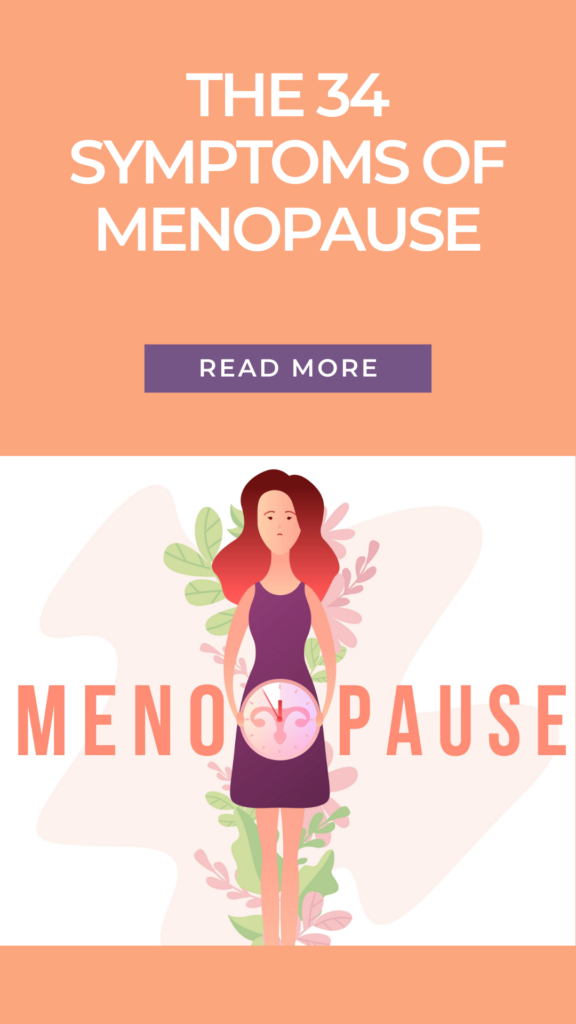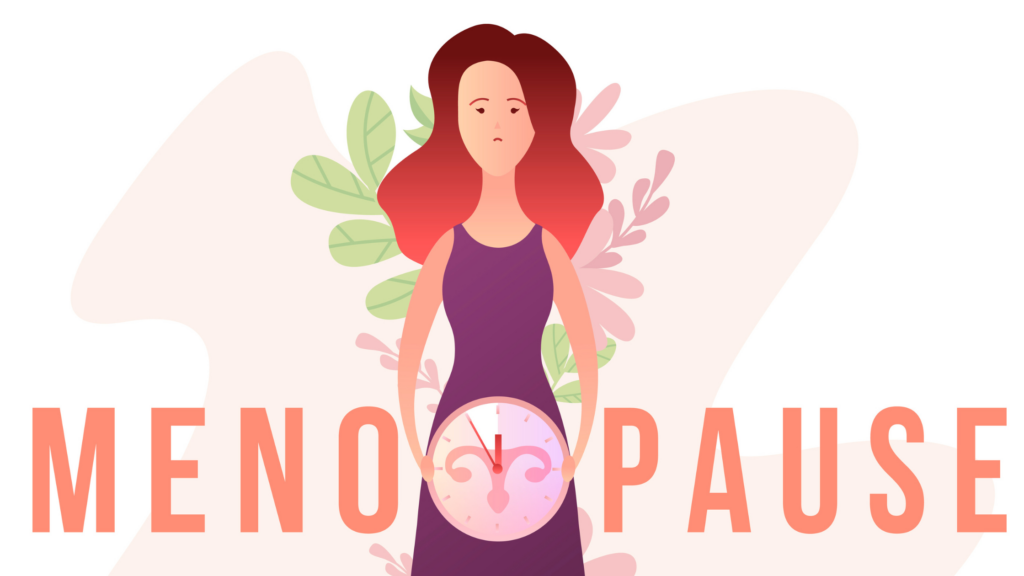Breaking down the 34 symptoms of menopause
Menopause marks a significant transition in a woman’s life, a time when the reproductive years come to an end. However, it’s not just a single moment in time but a process that unfolds over several years. Along with this transition comes a host of physical, emotional, and psychological changes, often referred to as the 34 symptoms of menopause. These symptoms can vary from mild to severe, and while some women sail through menopause with little discomfort, others face a more challenging experience.
In this post, we’ll break down the 34 symptoms of menopause, explain what they are, and provide tips on how to manage them. If you’re wondering what to expect or are already navigating menopause, this guide is for you. And don’t worry—there’s help available, including expert advice on the Reframing Midlife podcast, where we flip the script on midlife and laugh our way through the chaos!
What Are the 34 Symptoms of Menopause?
Menopause is defined by the cessation of menstruation for 12 consecutive months, typically occurring between the ages of 45 and 55. This phase, called perimenopause, can last for several years leading up to menopause, during which time your hormone levels (especially estrogen and progesterone) start to fluctuate. These hormonal changes lead to a variety of symptoms, both physical and emotional.
Here are the 34 common symptoms of menopause:
- Hot Flashes: Sudden feelings of warmth, often intense, that spread over the body, causing sweating and discomfort.
- Night Sweats: Hot flashes that occur at night, often leading to disrupted sleep.
- Irregular Periods: Periods may become unpredictable—shorter, longer, heavier, or lighter—before they stop altogether.
- Mood Swings: Emotional highs and lows, similar to those experienced during PMS but often more intense.
- Vaginal Dryness: A decrease in estrogen can cause dryness, itching, and discomfort during sex.
- Decreased Libido: Many women experience a loss of sexual desire due to hormonal shifts.
- Fatigue: Persistent feelings of tiredness and lack of energy, even with sufficient sleep.
- Sleep Disturbances: Difficulty falling asleep, staying asleep, or waking up too early.
- Memory Lapses: “Brain fog” and forgetfulness are common due to hormonal changes affecting cognitive function.
- Difficulty Concentrating: Trouble focusing on tasks or staying engaged with daily activities.
- Dizziness: Sudden, unexplained feelings of lightheadedness or dizziness.
- Weight Gain: Many women experience weight gain, particularly around the abdomen, due to hormonal fluctuations.
- Bloating: Increased gas and bloating may occur during perimenopause.
- Hair Loss: Thinning hair on the scalp or increased hair shedding.
- Thinning Hair: Hair becomes finer and may lose its natural fullness.
- Breast Tenderness: Pain or discomfort in the breasts, similar to PMS symptoms.
- Headaches: Migraines and tension headaches may become more frequent.
- Joint Pain: Aches and pains in the joints, often related to reduced collagen production.
- Burning Mouth: A dry, burning sensation in the mouth, along with changes in taste.
- Digestive Issues: Slower digestion, increased indigestion, or gastrointestinal discomfort.
- Allergies: Women may develop new allergies or experience worsened symptoms of existing allergies.
- Osteoporosis: A decrease in bone density, making bones more fragile and prone to fractures.
- Dry Skin: Skin may become drier and more prone to itching or cracking.
- Tingling Sensations: Some women experience tingling or numbness in the extremities.
- Electric Shock Sensations: Sudden, brief jolts of sensation, often described as a “zap.”
- Gum Problems: Gums may become more sensitive or prone to bleeding.
- Muscle Tension: Increased muscle tightness, often leading to discomfort or stiffness.
- Tingling Extremities: Numbness or tingling in the hands, feet, fingers, or toes.
- Anxiety: Heightened feelings of anxiety or panic that may occur without obvious triggers.
- Depression: Emotional changes during menopause can lead to feelings of sadness or hopelessness.
- Irritability: Increased irritability, often related to sleep deprivation and hormonal fluctuations.
- Panic Disorder: Sudden feelings of panic or an overwhelming sense of fear.
- Body Odor Changes: Some women notice changes in their body odor during menopause.
- Tingling Skin: A crawling sensation under the skin, known as paresthesia.
Managing Menopause Symptoms
The good news is that while these symptoms can be challenging, there are several ways to manage them effectively. Here are some tips for managing the most common menopause symptoms:
1. Hot Flashes & Night Sweats
- What helps?: Dress in layers, use fans, and keep your bedroom cool at night. Herbal remedies like black cohosh and lifestyle changes, such as avoiding caffeine and alcohol, may help reduce the frequency and intensity of hot flashes.
2. Mood Swings & Anxiety
- What helps?: Regular exercise, meditation, and yoga can help stabilize mood. If symptoms are severe, talk to your doctor about hormone therapy or other medications that can help.
3. Vaginal Dryness
- What helps?: Over-the-counter vaginal moisturizers and lubricants can make sex more comfortable. Prescription treatments, such as vaginal estrogen, are also available.
4. Sleep Disturbances
- What helps?: Establish a relaxing bedtime routine, limit screen time before bed, and try to maintain a consistent sleep schedule. If hot flashes are keeping you awake, try cooling pillows or moisture-wicking bedding.
5. Fatigue
- What helps?: Prioritize sleep, eat a balanced diet, and find time for gentle exercise like walking or swimming, which can increase your energy levels over time.
6. Weight Gain
- What helps?: Focus on eating whole foods, especially fruits and vegetables, and engage in regular physical activity, including strength training, which helps combat midlife weight gain.
7. Memory Lapses & Brain Fog
- What helps?: Brain-boosting activities like puzzles, reading, or learning a new skill can help sharpen your focus. Stay hydrated and make sure you’re eating a diet rich in omega-3 fatty acids to support cognitive health.
8. Hair Loss
- What helps?: Use gentle hair products and avoid excessive heat styling. A well-balanced diet and supplements like biotin may help strengthen hair.
9. Bone Health
- What helps?: Incorporate calcium-rich foods and vitamin D into your diet. Weight-bearing exercises like walking, hiking, or yoga can strengthen bones and prevent osteoporosis.
Call to Action: Join Us on the Reframing Midlife Podcast
Welcome to Reframing Midlife, a podcast where I’m flipping the script on midlife. I’m Dr. Diane Strachowski, your host, licensed psychologist, and guide through this wild, wonderful, and sometimes wacky phase of life!
Let’s face it—midlife can feel like a never-ending roller coaster. One minute, you’re conquering the world; the next, your hair’s migrating to your chin while your waistline’s taking over the world map! Sleep? What’s that? Sex drive? Might need a GPS to find it. And don’t get me started on mood swings!
But here’s the thing: midlife doesn’t have to be a horror show. It’s a chance to reinvent yourself, laugh at the chaos, and thrive like never before. Each week on the podcast, we’ll dive into the nitty-gritty of midlife changes—weight, energy, sleep, skin, hair, sex drive, and those delightful relationship shifts.
I’m bringing in the big guns—health, fitness, cognitive therapy, neuroscience, and nutrition experts. No topic is off-limits. We’ll discuss how to spice up your marriage, revamp your wardrobe, and discover hobbies that light you up.
I’ll be your guinea pig, trying out the latest recipes, products, and therapies, sharing my hilarious and sometimes disastrous experiences along the way. Subscribe to Reframing Midlife wherever you listen to podcasts and catch me on YouTube. You don’t want to miss a single episode! There’s a lot to unpack—are you ready?



